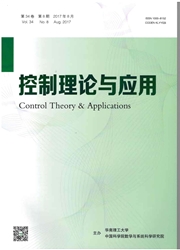

 中文摘要:
中文摘要:
多源信息融合的一个主要应用方向是目标识别,Dezert-Smarandache理论(DSmT)是一种有用的不确定推理方法,能较好地解决强冲突情况下的信息融合问题.在经典DSmT的融合过程基础上提出3种递归时空信息融合的方法:集中式、分布式无反馈和分布式有反馈的融合方法.当系统引入完整性约束条件时,需要采用证据的冲突系数来确定组合顺序,这在一定程度上克服了混合DSm组合规则不满足结合律的缺陷.最后用数值算例说明了本文所提出方法的有效性.
 英文摘要:
英文摘要:
Target identification is a major practical application of information fusion, in which DezertSmarandache theory (DSmT) is a useful method for dealing with problems with uncertainties and is efficient in combining conflicting evidences. We put forward three temporalspatial information fusion approaches including the centralized fusion approach, the distributed approach withoutfeedback and the distributed approach withfeedback. Especially, when integrity constraints are introduced to the system, it is necessary to employ the conflict distance parameter to determine the combination order of evidences. This will in some extent overcome the deficiency in noncommitative property in the hybrid DSm rule of combination. Numerical examples are provided to show the validity in applications of the proposed approach.
 同期刊论文项目
同期刊论文项目
 同项目期刊论文
同项目期刊论文
 Joint systematic error estimation algorithm for radar and automatic dependent surveillance broadcast
Joint systematic error estimation algorithm for radar and automatic dependent surveillance broadcast Data Reduction with Quantization Constraints for Decentralized Estimation in Wireless Sensor Network
Data Reduction with Quantization Constraints for Decentralized Estimation in Wireless Sensor Network A New Noise-compensated Estimation Scheme for Multichannel Autoregressive Signals from Noisy Observa
A New Noise-compensated Estimation Scheme for Multichannel Autoregressive Signals from Noisy Observa Dual-Decomposition Approach for Distributed Optimization in Wireless Sensor Networks, Wireless Algor
Dual-Decomposition Approach for Distributed Optimization in Wireless Sensor Networks, Wireless Algor Adaptive range-spread target detection based on modified generalised likelihood ratio test in non-Ga
Adaptive range-spread target detection based on modified generalised likelihood ratio test in non-Ga Diffusion-based EM Algorithm for Distributed Estimation of Gaussian Mixtures in Wireless Sensor Netw
Diffusion-based EM Algorithm for Distributed Estimation of Gaussian Mixtures in Wireless Sensor Netw Robust Distributed Fusion for System with Randomly Uncertain Sensor Estimation Error Cross-Covarianc
Robust Distributed Fusion for System with Randomly Uncertain Sensor Estimation Error Cross-Covarianc Adaptive Gaussian sum aquared-root cubature Kalman filter with split-merge scheme for state estimati
Adaptive Gaussian sum aquared-root cubature Kalman filter with split-merge scheme for state estimati 期刊信息
期刊信息
